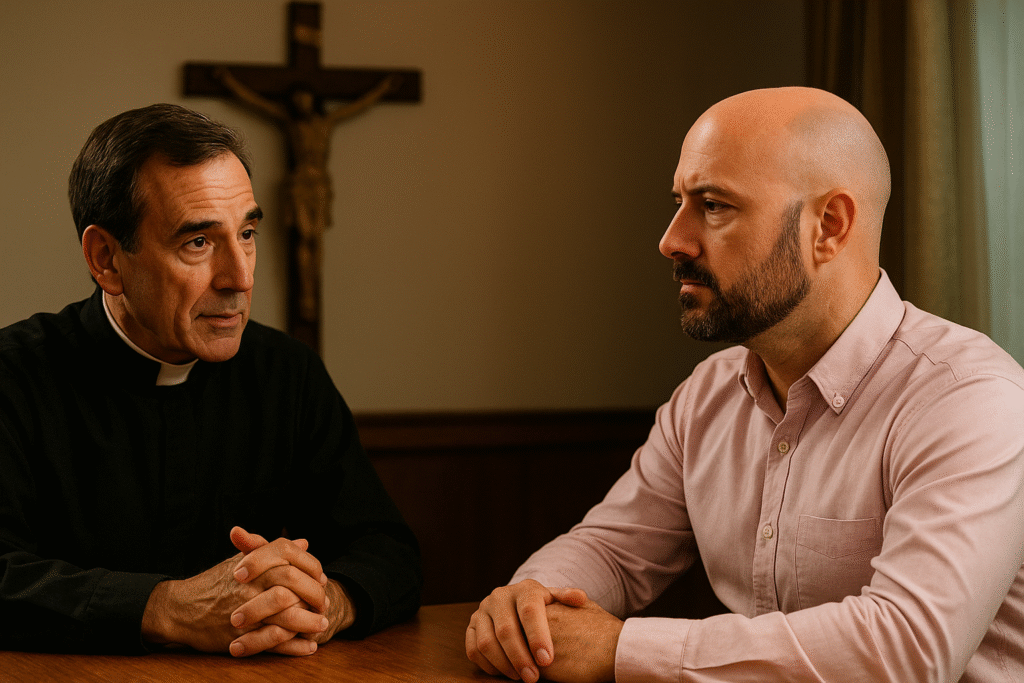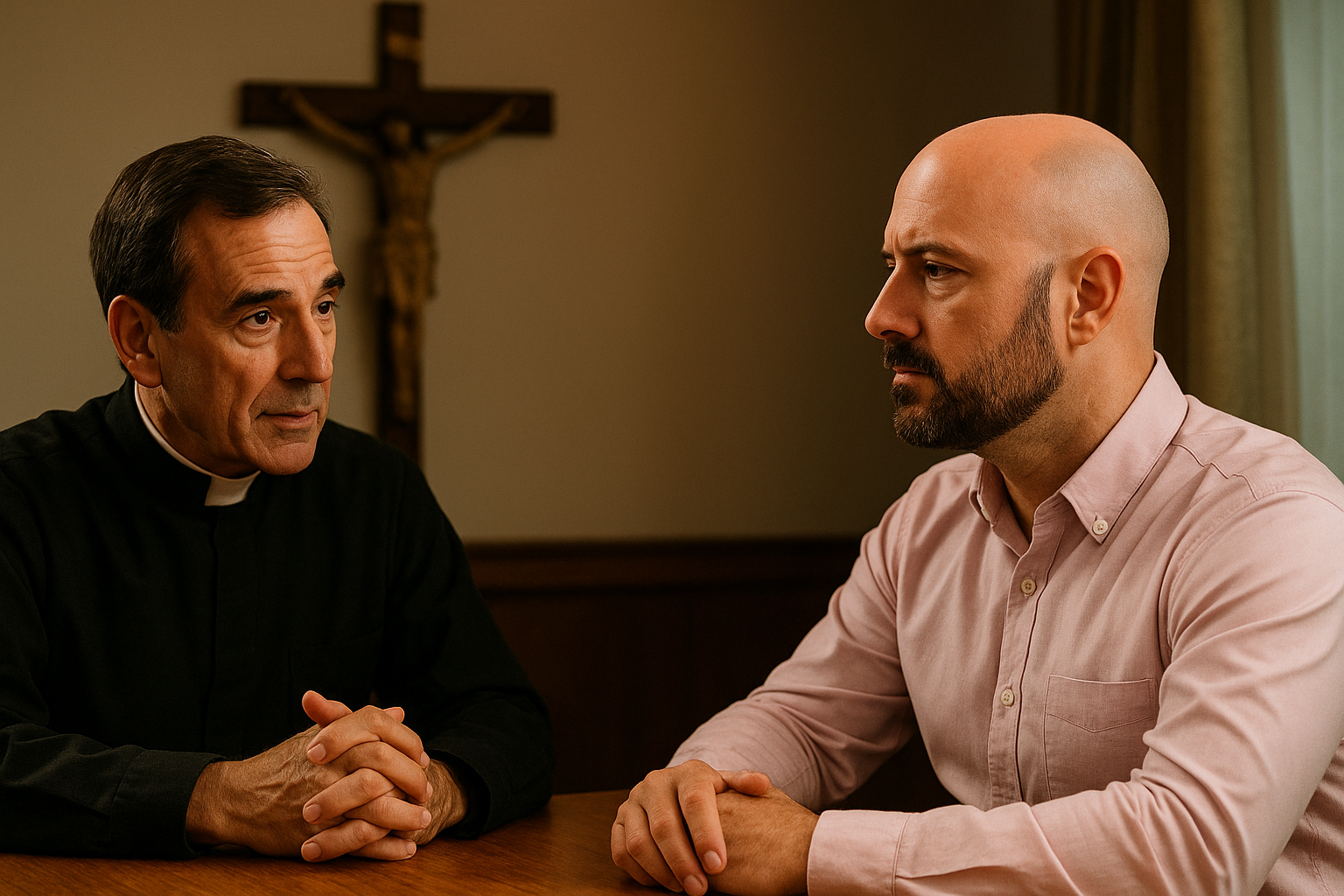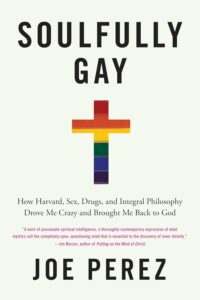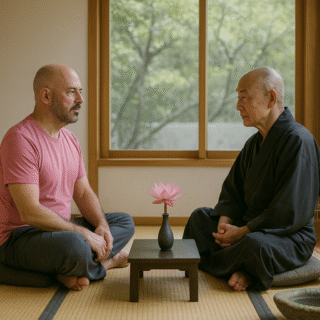
Participants:
- Fr. Thomas Rinaldi – A fictionalized composite Catholic theologian and seminary professor, deeply formed by John Paul II’s Theology of the Body (TOB).
- Joe Perez, M.Div. – Author of Soulfully Gay, blogger and influencer in the LGBTQ+ community, and teacher of the Unitive Way.
Fr. Thomas: Joe, thank you again for sitting with me in this space. We began with the Church’s view that homosexual acts are “objectively disordered,” not as a condemnation of the person, but as a recognition that such acts are outside the divinely revealed order. Would you still say that your response is grounded in a different theological anthropology?
Joe Perez: I would. Not because I deny divine order, but because I understand it in a broader frame. The anthropology I propose through The Unitive Way—and which was seeded in Soulfully Gay—is rooted in the experience of Presence. The climactic vision of that book was what I called the Cross in the Center of Everything: a mystical intersection of four sacred polarities—communion and agency, heteroeros and homoeros. This isn’t just poetry. It’s a re-mapping of theological anthropology in light of a revelation of divine immanence in the lives of gay men and lesbians.
Fr. Thomas: But Presence can be interpreted in many ways. In Catholic tradition, when we speak of the Real Presence, we mean the literal body and blood of Christ in the Eucharist. That’s not symbolic. It’s sacramental. Do you mean to suggest your view of presence is equally real?
Joe Perez: Yes, but from a nondual perspective. The Real Presence in the Eucharist is central to my understanding—absolutely. But I also believe that the Eucharist is not the only incarnation of Christ. It is the paradigmatic one for faithful Catholics, yes, but it points to a larger mystery: that Christ is present in us, in the flesh, when we embody divine love with full awareness.
For LGBTQ+ people, this realization can be radically healing. When two gay people come together in a moment of conscious, loving, erotic union—what I sometimes call sacramental sexuality—they may be experiencing something more than pleasure or intimacy. They may be participating in the Body of Christ through mutual recognition, surrender, and presence. In that moment, this is my body becomes not only Eucharistic language—it becomes a lived, incarnational truth.
Fr. Thomas: That is a bold claim. But I must press you: are you suggesting that tantric union—or erotic communion of any kind—could be equivalent to the Eucharist?
Joe Perez: Not equivalent. But analogous. The Eucharist is unique—it is the source and summit of the Christian life. Yet it also teaches us something about what incarnation means: that the divine is not far off, but enters into flesh, into matter, into communion. So when two people enter deeply into erotic presence—not as self-gratification, but as spiritual offering—they are enacting a small echo of that divine mystery.
And when that union is homophilic—meaning it involves sameness, mirroring, shared gendered experience—it often deepens into a form of Presence that is immediate and tender. God is present not through differentiation, but through resonance.
Fr. Thomas: Theologically, we would say that Christ is recognized in the other—especially in the marginalized, the broken, the poor. You’re extending that logic to say that same-sex love is not merely dignified in a pastoral sense, but actually revelatory of God?
Joe Perez: Exactly. Homophilia, in its purest form, is the recognition of God through shared being. It’s not only psychological resonance—it’s theological. When I, as a gay man, look into the eyes of my beloved and feel the stirrings of homoeros, that desire can become a portal to divine presence. Not because it’s biologically productive, but because it is spiritually generative. It generates the awareness of God in me as me, and in him as him, and between us as the space of encounter.
This is the Descending Current. Just as the Ascending Current of love reaches up into spirit, the Descending Current reaches down into embodiment, sameness, presence. And Christ is in both.
Fr. Thomas: You know, John Paul II does say that the body “speaks a language.” You’re offering an alternative grammar. In TOB, that language is read as teleologically oriented toward procreative union, but you’re reading it as a mystical syntax of resonance.
Still, I must raise a concern: where is the boundary? If any erotic union can be sacramental, what protects this from descending into subjectivism or moral relativism?
Joe Perez: A fair question. And my answer is: presence protects it. The Unitive Way doesn’t affirm all erotic acts indiscriminately. What I speak of is not hedonism, but tantric fidelity—a conscious eroticism rooted in mutual regard, spiritual intention, and sacramental awareness. This is not about pleasure for its own sake. It’s about recognizing the presence of Christ in the moment of surrender, in the gaze of the other—even surely, not to deny it in the contact of genitalia with genitalia—meaning, in the vulnerability of agape’s descent and the vitality of eros’s ascent.
Fr. Thomas: But what of sin? In the Catholic view, there is a moral order given by God. To act outside that order is to rupture communion, even if the intention is sincere.
Joe Perez: I don’t deny sin, but I understand it differently. Sin is not defined solely by disobedience to an external law, but by the contraction of awareness—the failure to be present in love. When eros becomes self-seeking, manipulative, or disconnected from divine awareness, it becomes distorted. But when eros is integrated, whole, and surrendered to divine presence, it becomes sanctified.
And perhaps the Church, in time, will see that the holy is not always found in difference and complementarity and procreation. Sometimes it is found in recognition, resonance, and creativity—in the sacred sameness of two souls becoming one in God.
Fr. Thomas: Your vision is poetic, and there is beauty in it. But we must also uphold the integrity of tradition. The Church is not free to rewrite the anthropology handed down through the ages.
Joe Perez: Nor am I asking the Church to discard it. I am asking the Church to transfigure it. The Cross in the Center does not deny the verticality of the Church’s teaching; it notes the bi-directionality of the vertical (God’s agape reaching down to creation through incarnation, and creation ascending to God through theosis), and it deepens the horizontal (masculine animus or agency connecting to feminine anima or communion, as opposed to male bodies having procreative intercourse with female bodies). Heterophilia and homophilia. The Unitive Way is not an overthrow—it is a fulfillment, a way of seeing that makes room for what has been excluded.
Fr. Thomas: If Christ is truly present in the Eucharist, then perhaps He is also present in our conversation. And if presence is the ground of your theology, then let it be the ground of our ongoing dialogue too.
Joe Perez: Amen to that. Let us meet at the table—Eucharistic and human—and recognize the Body of Christ in one another. Even here. Especially here.





